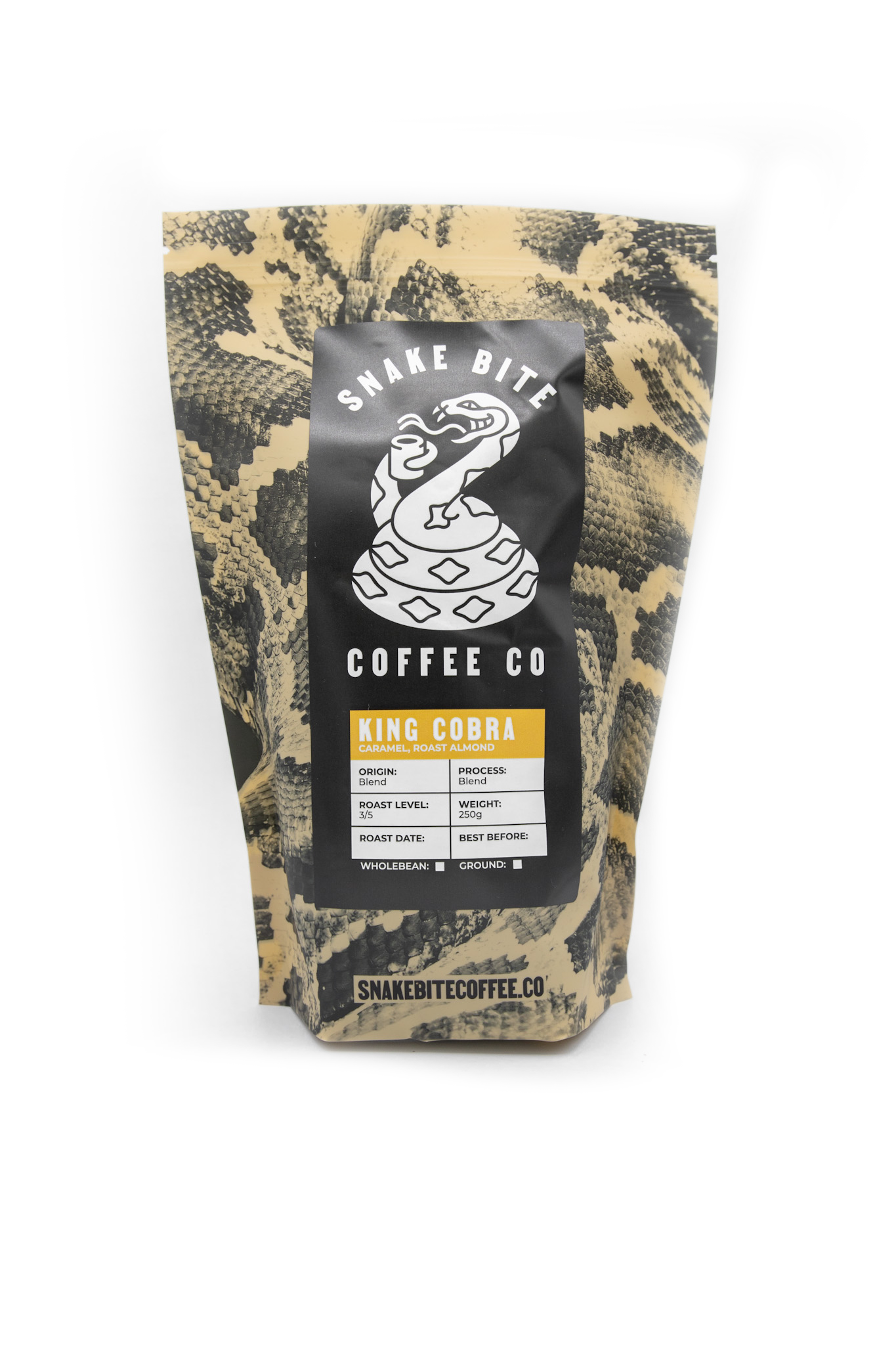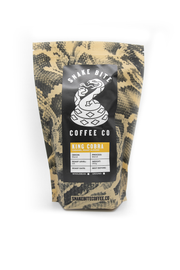King Cobra - House Blend
A premium blend of medium-roasted Brazilian and Mexican coffee beans crafted for those who appreciate a robust, well-rounded espresso. With smooth caramel, roasted almond, and a hint of chocolate, this blend strikes the perfect balance of strength and complexity.
A Blend with Depth and Harmony
King Cobra Espresso combines the best of two coffee origins. Brazilian beans bring rich chocolatey tones and a subtle sweetness, while Mexican beans add a vibrant, fruity brightness. Together, they create a balanced, full-bodied espresso with nutty undertones and a buttery caramel finish.
Tailored for Espresso Enthusiasts
This blend is designed to deliver a bold, satisfying shot with layers of flavour. The smooth, nutty profile from Brazil complements the lively fruitiness of Mexico, making every cup an experience worth savouring. It’s equally indulgent in milk-based drinks, where the caramel and almond notes shine.
Versatile for Any Brew Method
While ideal for espresso machines, King Cobra’s adaptability ensures excellent results across brewing methods, from moka pots to AeroPress. Enjoy its dynamic flavour profile whether you’re pulling a shot or crafting a pour-over.
Tasting Notes
Caramel & Roast Almond.
About the farmers:
- Brazil
- Mexico
Fazenda Picada is located in the Nova Resende region of Sul de Minas. It is owned and operated by the Madeira family, who have a deep personal and professional connection to the coffee industry. Marcelo Miguel, the owner of Fazenda Picada, was introduced to coffee culture by his father José Alves Madeira, who is also a coffee producer. Marcelo grew up watching his father work on the farm and has since dedicated his own career to coffee production.
Fazenda Picada covers an area of 33 hectares and is one of three farms owned by the Madeira family, along with Sítio Catalão and Sítio Serra Pelada, all located in the Nova Resende region. Marcelo works closely with his father and brother Ronaldo on the farm, participating in all aspects of coffee production from soil nutrition to the harvest period.
The farm has a post-harvest processing facility that includes concrete patios, rotary dryers, and a machine to remove the husks from the coffee beans. The concrete patios are used to process coffee as naturals, while the rotary dryers are used to finalise the drying of some lots.
Oaxaca is the fourth coffee-producing state in Mexico, making up about 10% of national production, and standing out for having specialty varieties; small scale indigenous producers of Oaxaca have vastly preserved the traditional typicas and bourbons, which are known for their delicate cup profiles.
Most of the farms in Oaxaca are between 0.5 and 2 hectares each, and are managed by indigenous populations who greatly help preserve the native ecosystems. Oaxaca mainly produces above organic standards: in addition to the absence of agro chemicals, the farms actually boast incredible biodiversity, organic matter, and life in the soils, along with a shaded environment that helps to stabilise the temperature.
The drawback of Oaxaca’s coffee production is its extremely low yields, only 1 to 3 bags per hectare. The main reason for this is the lack of access to credit, and the absence of technical support, which has made it impossible to recover from the rust epidemic of the mid 2010s.
Brazil
Fazenda Picada is located in the Nova Resende region of Sul de Minas. It is owned and operated by the Madeira family, who have a deep personal and professional connection to the coffee industry. Marcelo Miguel, the owner of Fazenda Picada, was introduced to coffee culture by his father José Alves Madeira, who is also a coffee producer. Marcelo grew up watching his father work on the farm and has since dedicated his own career to coffee production.
Fazenda Picada covers an area of 33 hectares and is one of three farms owned by the Madeira family, along with Sítio Catalão and Sítio Serra Pelada, all located in the Nova Resende region. Marcelo works closely with his father and brother Ronaldo on the farm, participating in all aspects of coffee production from soil nutrition to the harvest period.
The farm has a post-harvest processing facility that includes concrete patios, rotary dryers, and a machine to remove the husks from the coffee beans. The concrete patios are used to process coffee as naturals, while the rotary dryers are used to finalise the drying of some lots.
Mexico
Oaxaca is the fourth coffee-producing state in Mexico, making up about 10% of national production, and standing out for having specialty varieties; small scale indigenous producers of Oaxaca have vastly preserved the traditional typicas and bourbons, which are known for their delicate cup profiles.
Most of the farms in Oaxaca are between 0.5 and 2 hectares each, and are managed by indigenous populations who greatly help preserve the native ecosystems. Oaxaca mainly produces above organic standards: in addition to the absence of agro chemicals, the farms actually boast incredible biodiversity, organic matter, and life in the soils, along with a shaded environment that helps to stabilise the temperature.
The drawback of Oaxaca’s coffee production is its extremely low yields, only 1 to 3 bags per hectare. The main reason for this is the lack of access to credit, and the absence of technical support, which has made it impossible to recover from the rust epidemic of the mid 2010s.



